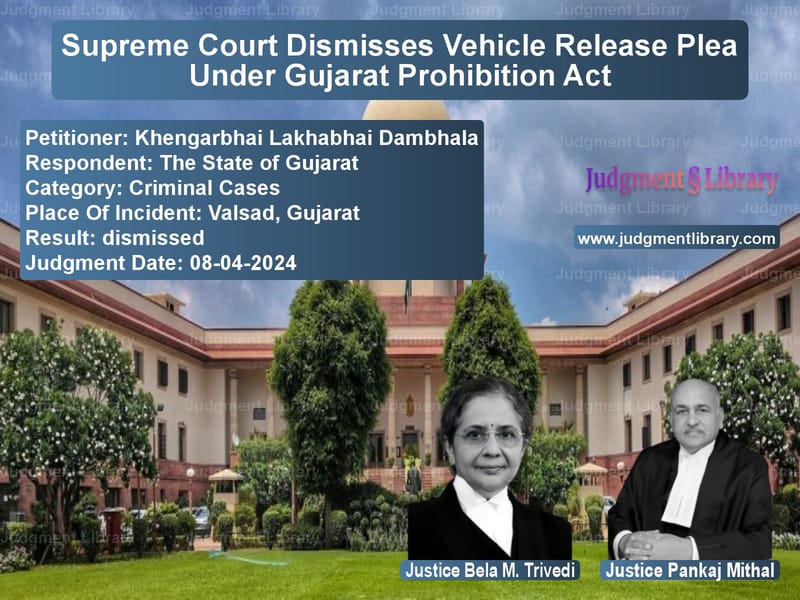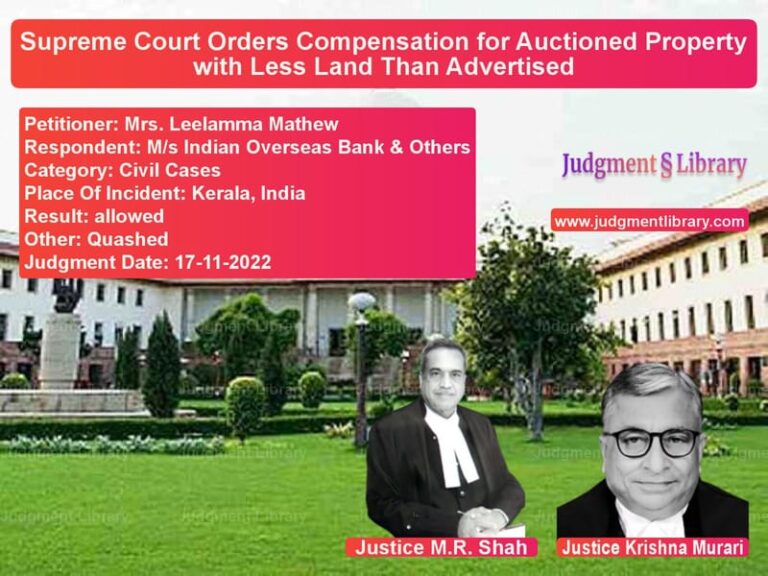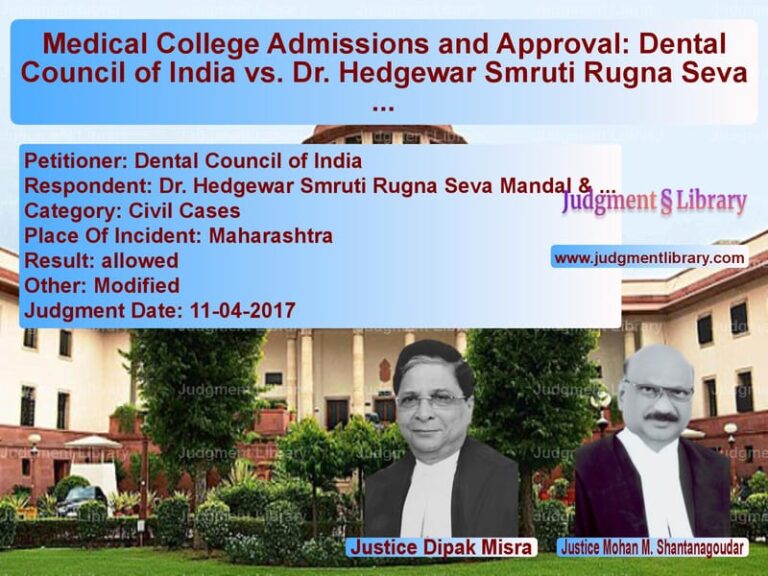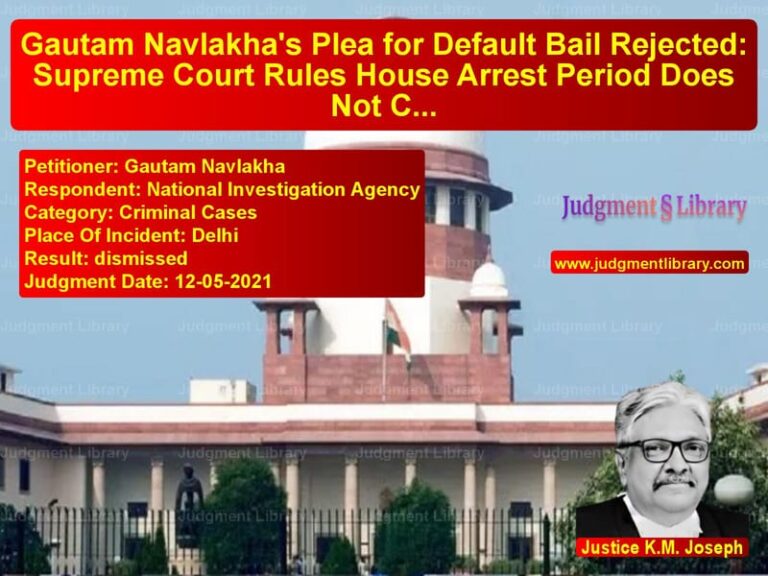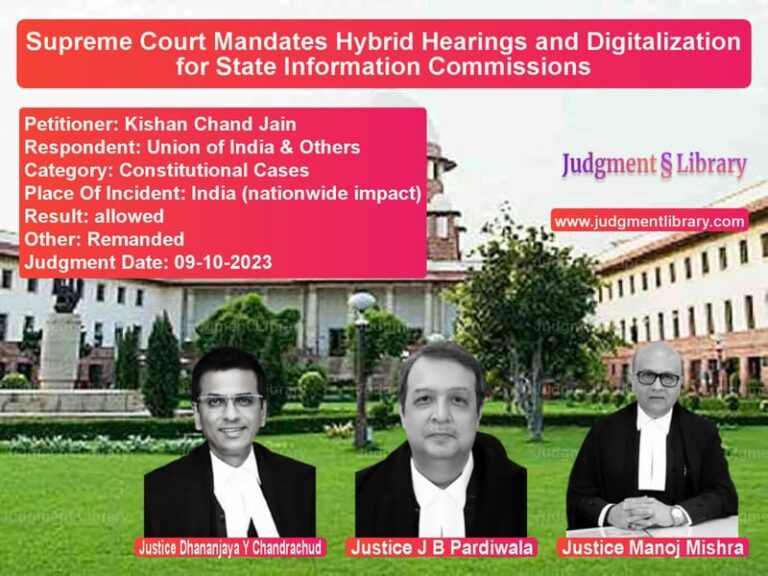Supreme Court Dismisses Vehicle Release Plea Under Gujarat Prohibition Act
The case of Khengarbhai Lakhabhai Dambhala vs. The State of Gujarat revolves around the confiscation of a vehicle under the Gujarat Prohibition Act, 1949. The Supreme Court had to determine whether the appellant could seek the release of his vehicle through a writ petition under Article 226 of the Constitution, bypassing the statutory provisions of the Criminal Procedure Code (CrPC).
The Court dismissed the appeal, ruling that the appellant should have approached the appropriate criminal court under Section 451 of the CrPC instead of directly filing a writ petition in the High Court.
Background of the Case
The appellant, Khengarbhai Lakhabhai Dambhala, claimed ownership of a vehicle (Eicher 10.80, Blue, GJ 05-BT-0899) that was seized as Muddamal property in connection with an FIR registered under the Gujarat Prohibition Act. The case was registered at Pardi Police Station, District Valsad, on April 29, 2023.
The police intercepted the vehicle based on secret information and found that it was carrying 1240.200 liters of English liquor, worth approximately Rs. 7 lakhs, without a valid permit. The driver, Lakhabhai Khengarbhai (the appellant’s son), was arrested, and the vehicle was seized.
The appellant filed a Special Criminal Application (No. 6465 of 2023) before the Gujarat High Court, seeking release of the vehicle. The High Court dismissed the application on June 8, 2023, prompting the present appeal before the Supreme Court.
Key Legal Issues
- Whether the appellant could directly invoke Article 226 for vehicle release instead of following the CrPC provisions.
- Whether Section 98(2) of the Gujarat Prohibition Act bars vehicle release if liquor exceeding the prescribed quantity is found.
- Whether the High Court’s decision to reject the appellant’s plea was justified.
Arguments by the Appellant
The appellant contended:
“The vehicle is a source of livelihood, and its continued confiscation causes undue hardship. The High Court should have exercised its discretionary powers to release the vehicle.”
He argued that under Section 451 of the CrPC, courts have the power to release seized property pending trial.
Arguments by the Respondent (State of Gujarat)
The State of Gujarat opposed the plea, arguing:
“Section 98(2) of the Gujarat Prohibition Act explicitly forbids the release of vehicles involved in liquor smuggling if the quantity seized exceeds the prescribed limit of 20 liters.”
The respondent further contended that the appellant bypassed the statutory remedy by directly approaching the High Court.
Supreme Court’s Analysis
1. Proper Forum for Seeking Vehicle Release
The Court held that the appellant’s plea was misdirected:
“When there is a specific statutory provision in the CrPC empowering the criminal court to decide on seized property, invoking Article 226 is not the appropriate course of action.”
The Court emphasized that Section 451 of the CrPC provides a remedy for seeking custody of seized vehicles.
2. Interpretation of Section 98(2) of the Gujarat Prohibition Act
The Court examined the provision, which states:
“Any receptacle, package, or covering containing seized liquor, along with any conveyance used in its transport, shall be liable for confiscation and shall not be released on bond or surety till the final judgment of the Court.”
It ruled that while this section creates an embargo, it does not override judicial discretion under Section 451 of the CrPC.
3. Harmonizing CrPC and Gujarat Prohibition Act
The Court applied the doctrine of harmonious construction:
“While the Prohibition Act mandates confiscation, Section 451 of the CrPC empowers courts to determine interim custody of seized property.”
It clarified that an accused or owner must first approach the trial court for relief before seeking higher judicial intervention.
Final Judgment
The Supreme Court dismissed the appeal, ruling:
“The appellant’s remedy lies before the trial court under Section 451 of the CrPC. The High Court rightly declined to entertain the writ petition.”
However, the Court granted liberty to the appellant to file an application before the competent trial court.
Key Takeaways from the Judgment
- Petitioners must exhaust statutory remedies before invoking writ jurisdiction under Article 226.
- Section 98(2) of the Gujarat Prohibition Act does not override CrPC provisions on interim custody of seized vehicles.
- High Courts cannot bypass procedural requirements when specific statutory provisions exist.
- Confiscation laws must be interpreted in harmony with general criminal procedure rules.
- The judgment reinforces the principle that writ jurisdiction is an extraordinary remedy, not a substitute for regular legal channels.
Judgment Date: April 8, 2024
Judges: Bela M. Trivedi, Pankaj Mithal
Petitioner Name: Khengarbhai Lakhabhai Dambhala.Respondent Name: The State of Gujarat.Judgment By: Justice Bela M. Trivedi, Justice Pankaj Mithal.Place Of Incident: Valsad, Gujarat.Judgment Date: 08-04-2024.
Don’t miss out on the full details! Download the complete judgment in PDF format below and gain valuable insights instantly!
Download Judgment: khengarbhai-lakhabha-vs-the-state-of-gujarat-supreme-court-of-india-judgment-dated-08-04-2024.pdf
Directly Download Judgment: Directly download this Judgment
See all petitions in Bail and Anticipatory Bail
See all petitions in Fraud and Forgery
See all petitions in Judgment by Bela M. Trivedi
See all petitions in Judgment by Pankaj Mithal
See all petitions in dismissed
See all petitions in supreme court of India judgments April 2024
See all petitions in 2024 judgments
See all posts in Criminal Cases Category
See all allowed petitions in Criminal Cases Category
See all Dismissed petitions in Criminal Cases Category
See all partially allowed petitions in Criminal Cases Category

